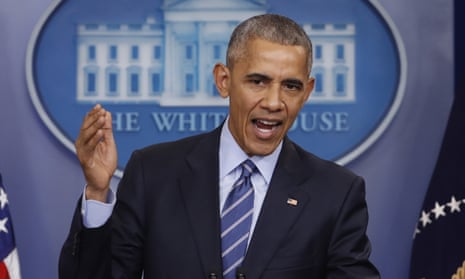Here is a greatest hits package of Barack Obama’s speeches – something to consolidate his canon in the same way that The Very Best of did for the Eagles or 20 Golden Greats for the Beach Boys. It’s 26 Golden Greats, in this case – a thoughtfully chosen selection, going from his amiably stinging 2002 speech against the Iraq war as a state senator (“What I am opposed to is a dumb war”) to his UN valediction last September, taking in the “race speech”, the “red-state-blue-state speech”, the Cairo speech on Islam, both inaugurals, the eulogies for the murdered pastor Clementa Pinckney and the victims of the Sandy Hook shooting, not to mention, of course, the electrifying speech he gave on election night.
We see Obama in hope-mongering high style; we see him negotiating tricky questions with forensic intelligence; we see him on the attack and we see him in grief, at home in the black folk pulpit and on the international stage. Obama isn’t immune to the empty phrase – but you can see a serious mind at work, here, and a coherent worldview. You can also see how – as per Mario Cuomo’s remark that you campaign in poetry and govern in prose – the register comes down after the election. By the time he’s a couple of years in power and battling an obstructionist congress, he sounds plain pissed off: not so much “yes we can” as “I am here to say that they are wrong”.
That said, even Obama super-fans might hesitate to read this book through from one cover to the other. He’s a remix artist – as was Martin Luther King – and the set phrases and the showy rhetorical tricks don’t half recur. You notice he leans heavily on the repetition games of anaphora (repeating a word or phrase at the beginning of successive sentences), epistrophe (repeating one at the end) and symploce (doing both things at once, sandwich-style). We keep meeting Michelle (“the love of my life”), Sasha and Malia (“I love you”) and his grandma. We keep encountering the “arc of history” bending; we spot yet another little parable in the peroration (“There’s one story in particular…”); another reference to what “scripture tells us”; another evocation of the golden rule; more boilerplate about the “American promise”; another King quote; another crafty use of the date or the venue in which he’s speaking to give historical resonance.
But it does to remember that speeches on the page are sheet music. Obama’s lived in his delivery – and he has an astonishing ear for cadence. Watch him, at his best, vamp round a phrase such as “yes, we can”, and he hits the stresses like a jazz drummer.
“It was the call of workers who organised, women who reached for the ballot, a president who chose the moon as our new frontier, and a king who took us to the mountaintop and pointed the way to the promised land: Yes, we can, to justice and equality. Yes, we can, to opportunity and prosperity. Yes, we can heal this nation. Yes, we can repair this world. Yes, we can.”
The chutzpah of the man is impressive: a few days before he flew to Norway to accept the Nobel peace prize, he announced plans to send 30,000 more troops to Afghanistan. Yet the speech he gave in Oslo took the issue head-on, making a case for just war in which he casts troops “not as makers of war, but as wagers of peace”. That’s characteristic. Faced with the scandal over his former pastor Jeremiah Wright, Obama gave a speech on race that let nobody off the hook. Speaking at the Catholic University of Notre Dame, he addressed abortion directly. Among religious leaders he offered a tough discussion of the separation of church and state. In Cairo, he addressed western-Muslim relations. Always conciliatory; always foxily co-optative; always looking for a reasonable common ground. Mind you, there are limits: the Sandy Hook speech doesn’t use the G-word once. And those promises to close Guantánamo…
It wasn’t all vaulting words and airy dreams. Obama, having come up through Chicago, was also a steely political operator. Ahead of the 2008 Democratic primaries, for instance, he gave a speech in Des Moines, Iowa to test the waters for a run at the nomination. The editors note: “As Obama committed his address to memory per dinner rules, his organising team worked to ensure that his partisans would dominate the audience. Ultimately, of the estimated 9,000 people that attended, the Obama campaign claimed 3,000 as its own supporters.” Belt and braces: good speech and guaranteed applause. Or, as later: speak of hope and dreams, but keep Rahm Emanuel handy.
There’s no special reason to buy these in dead tree form – all his major speeches are online – but the introduction is excellent and it’s a nice thing to have on your shelf. Lordy, we’re going to miss him.

Comments (…)
Sign in or create your Guardian account to join the discussion